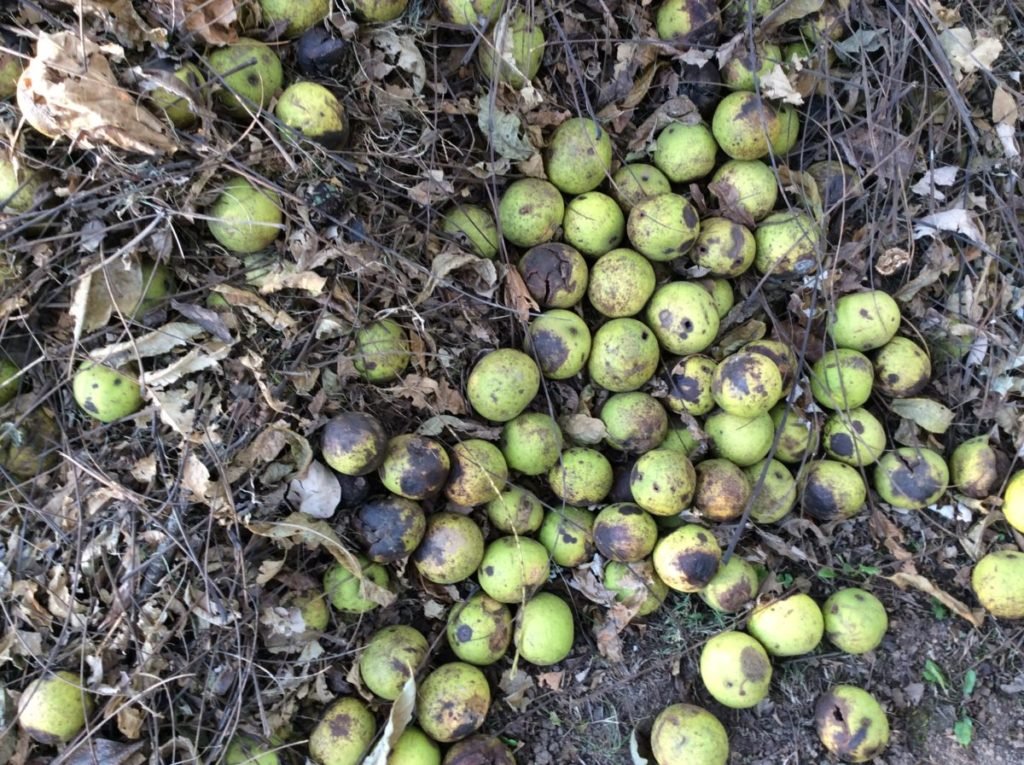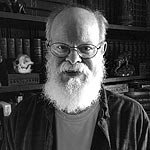Nature itself is meaningless; it is only as we interpret it that it has meaning.
John Canaday, What is Art?
In our side yard a walnut grows. Higher than the house, it is 104 inches in circumference at chest height. It was a large tree when my wife, our two daughters and I moved here nearly forty years ago. The girls found bits of glass, rusty nuggets and triangles of white porcelain around its trunk like offerings from another time. Indeed, they indicate a vanished house that must have stood nearby, as an old well and hand pump testify.
Most years, our tree produces an abundance of nuts, standing in relative solitude in an expanse of green. But each year I have to make a calculation, gaming with Nature as it were. I have to time my mowing around the few weeks of the falling head splitters. When I notice the first few on the ground, I mow under the tree, those few banging in the mower deck like a thrown stick or stone, like the neighbor disciplining his tin roof with a two pound hammer. I hope that they’ll fall in unison, that overnight the harvest will farewell their branches and seed the world. Usually this does not happen.
As grass grows and the dirty tennis balls come to rest in groups of three or five or seventeen, I mow the rest of the yard circling outside the dripline of the tree’s crown. They embed themselves in damp soil or in drought, bounce down the slight incline northwest of the gnomen-like shadow.
In late October chill, I start from the furthest rolled and work around the compass cardinals, creating a known task. I see what I have to do though I stumble over them nearly twisting my ankles or falling on my behind. The garden rake pries them out of the ground and grass, coaxes them toward the trunk, like procrastinating children to bedtime. In leaner years, I can gather them around in an afternoon. I leave them there to blacken the black soil.
In years of prodigious production, I have difficulty pulling the great moraines of nuts, sticks and leaves through the grass, so I use a coal shovel, more or less like a large dustpan, to load them into a black poly wheelbarrow. It takes five or six loads to fill my Tacoma pick-up, though I don’t keep track exactly, don’t think of some useful rule of thumb. I back up to the forest edge brush pile and rake them out of the truck bed. Squirrels will find this treasure to their wintering delight, an easy luck. Our friends and neighbors ask us if we eat them and without shame, answer in the negative, knowing the fool’s price we’d pay, worms and rot there before us.
As I admire my clean lawn after a few afternoons of labor, a THUD behind me reminds me that reality loves to play tricks on us. I look skyward through the nearly leafless tree to see a solar system of orbs waiting their appointed turn to call me to my humility.

The World’s Simple Withholding
Unpleasant in October sweat,
an almanac’s kind of humor, I rake
fallen walnuts from thick grass
so I can mow one last time before winter.
Three seniors rock on the porch
of the nursing home across the street,
laughter punches through
the shuffle of conversation.
The plaid man waves so I reply.
He beckons each time I fan gnats
from my eyes or wipe my brow
with the handkerchief of truce.
Around the compass, I gather green
children to their trunk. None
but squirrels will thank me,
though I will deny them the easy seed
of birdfeeders come winter.
My afternoon task finished,
athletic shoes stained the brown of rot,
I am turned around by thuds
like a deliberate tease, a scolding.
The old men are amused at my dubious
labor, theirs safe in the barn of days.
I look up against the deep blue
to see the world’s simple withholding.

Share this post with your friends.


strong senses of fall!
elizabeth
Loved this, Fred. Both the lyrical prose and the poem. Thank you for drawing us into autumn’s own world.
Rose
Thank you for your prose and poetry Fred, your story and language. The surprise of tennis balls and homage to labor, yours and that in the past of the nursing home residents!